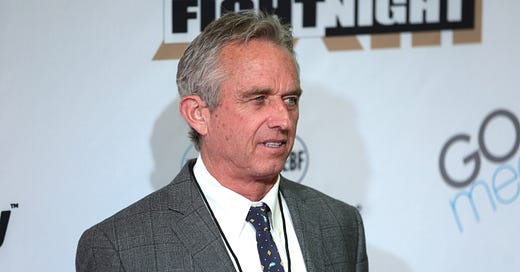Robert Kennedy, Jr. has decided to quit his campaign for the 2024 Democratic presidential nomination and will now run as an independent. There’s a good chance his name will be on multiple state ballots next November, including some swing states. Whom exactly does that hurt or help? That’s less clear than it may seem.
Let’s just stipulate that Kennedy will not get a lot of votes, and that has less to do with who he is or how he acts than it does with the fact that he’ll be a third party candidate. If he gets over three percent of the vote that would be a very good third party showing; it would probably be more like one percent. But that one percent could make a difference in a close state contest; the key is whether those votes come more out of Joe Biden’s support or Donald Trump’s.
This is a particularly tricky question for this candidate. The Kennedy name has been closely associated with the Democratic Party for the entire lives of nearly all Americans. His father remains a beloved figure on the left, both for his inspiring 1968 presidential campaign and for its tragic ending. And along with RFK’s father, his storied aunt and uncle take up very prominent positions in the Democratic Pantheon.
But Kennedy has advocated a bizarre set of policy stances over the years — a combination of environment activism, baseless conspiracy theories about vaccines that long predate Covid, and some casual antisemitism. This is something that political scientists politely refer to as being “off-dimensional.” That is, no single one of these viewpoints is all that rare, but the combination of them is highly unusual, particularly for someone so long steeped in American politics.
As Nathaniel Rakich demonstrated at FiveThirtyEight, Kennedy is far more highly thought of by Republicans than by Democrats. (I can confirm that a number of local Republican leaders I’ve interviewed have expressed serious interest in Kennedy.) This collection of polls from July shows that his net favorability was, on average, around 25 to 30 points among Republicans, but varied wildly among Democrats and averaged to -5.
The huge variability in Democrats’ assessment of RFK strikes me as important. This could be about question wording, or about sample selection, or something else, but it suggests that Democrats are having a hard time figuring this guy out. Rakich writes a bit about this, as well as the fact that Democrats’ assessments of RFK have been plummeting throughout 2023.
But how would this translate to actual votes? If Republicans think more highly of him than Democrats do, that might suggest that Republicans would be more likely to peel away from their nominee and support him, which would mean dividing the Republican vote in some key states and handing those contests to the Democrats. But would that actually happen?
To be sure, there are some Republicans who are leery of Donald Trump as their nominee for a third time. But those largely consist of people who a) want the Republican Party to return to the conservative principles of the Reagan/Bush years, b) think the party needs to nominate someone who is less off-putting and has a better chance of winning elections, c) don’t like Trump’s conspiratorial world view, or d) some combination of the above. I doubt they see RFK as an improvement. Similarly, for Republicans who find Trump insufficiently skeptical about vaccines (he does encourage vaccinations, after all!), do they really think Kennedy is closer to their preferences or more likely to put them into law?
Another thing — if you look at the polling chart above, you see that only around 75% of the people polled had opinions about RFK. Presumably the other 25% would develop some kind of opinion of him as the November 2024 election approaches, but that 25% likely acts very differently from the others who already have hard opinions on RFK. What does that look like? Does a Democrat who’s not paying a lot of attention to the presidential contest right now learn about RFK’s policy stances and get repelled by him? Or does that Democrat just see that someone named Robert Kennedy, Jr. is running and figure that’s a decent alternative to a Joe Biden they feel lukewarm toward?
Finally, how much of what Republicans in the chart above like about RFK is that he’s a Democrat saying things Democrats don’t want to hear? Are they as interested in him when he’s an independent?
My point is that the limited evidence we have about RFK’s popularity so far is not terribly instructive about what kind of impact he’d have as a third party candidate a year from now. Even if Republicans like him more than Democrats do, it’s far from clear they’d abandon Trump for him, and we don’t know how the less attentive Democrats and Republicans will ultimately come to think about him or what heuristic they’d use for that.
There’s a decent chance RFK’s candidacy just won’t matter. But if it does, neither Democrats nor Republicans should take it for granted that they’ll benefit.







Nice analysis. You’re right, hard to tell how he’ll affect the election. But I think that he could pull the militant anti-vax votes away from Trump (remember, Trump get booed when he speaks positively about vaccines at rallies). Also, there’s a good chance Trump is not the nominee, so he’ll take a lot more votes from any other nominee.
He's a schill for the Rcons gerrymandering of the Elections to get Trump Elected- Period!